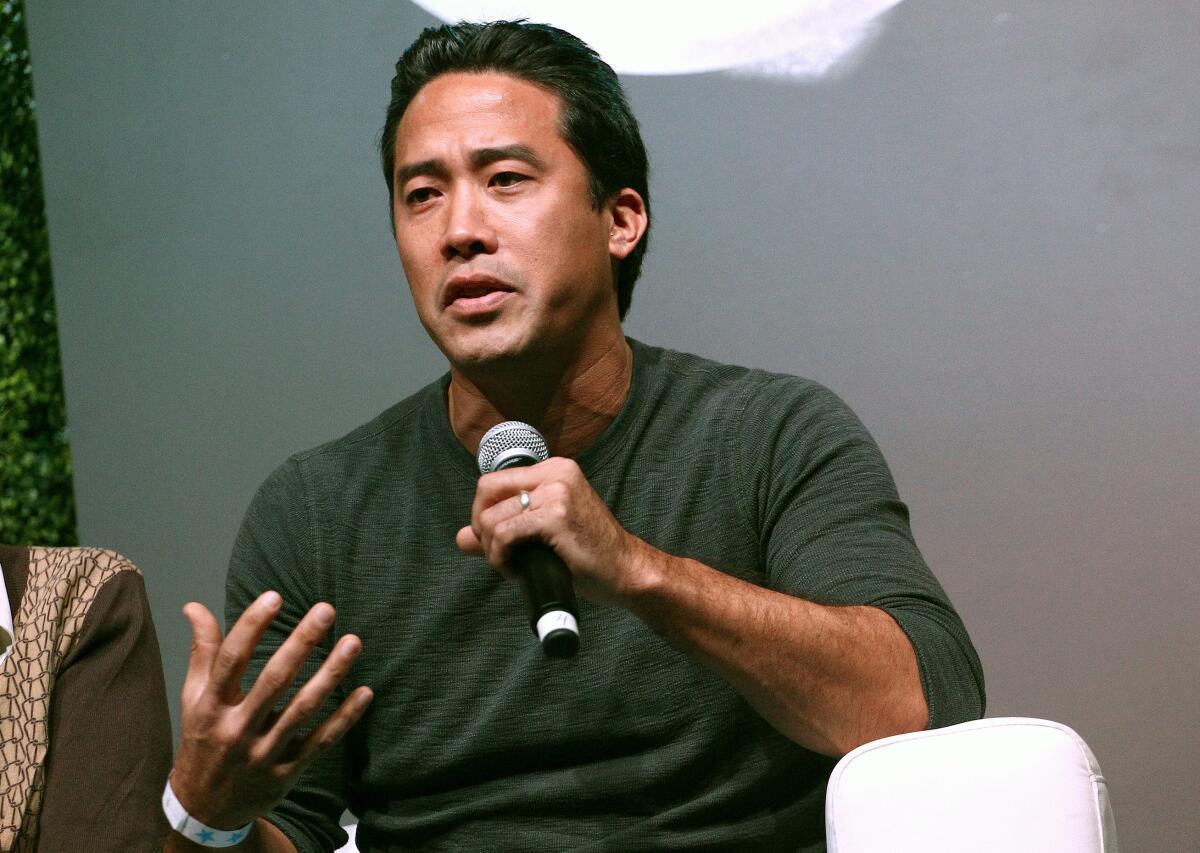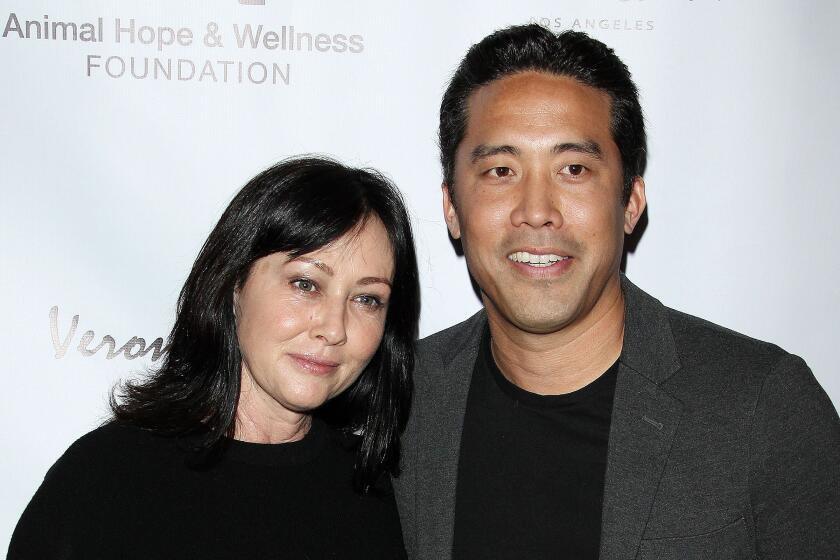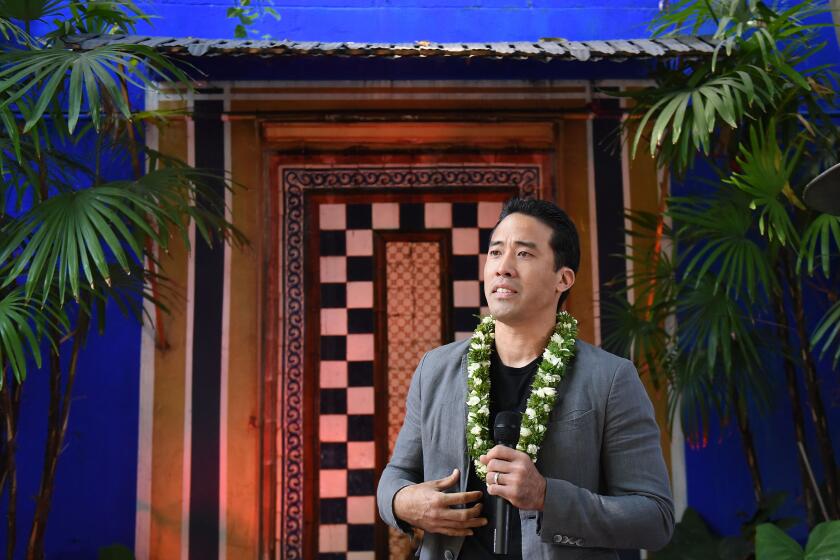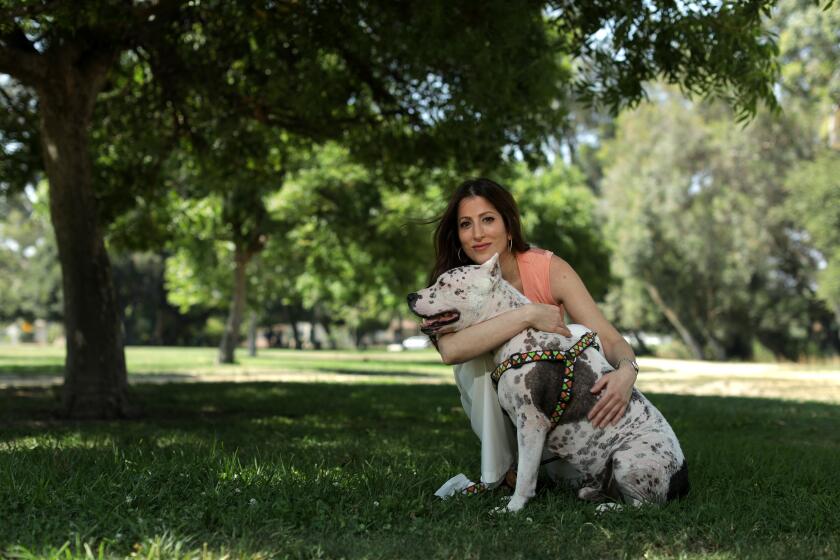After Times investigation, dog activist Marc Ching charged by city’s animal protection unit

- Share via
Los Angeles prosecutors have filed charges against prominent animal rescuer Marc Ching, alleging that the Hollywood-backed activist practiced veterinary medicine without a license and engaged in deceptive advertising at his for-profit pet food store.
The criminal case comes after a Times investigation earlier this year uncovered years of complaints by veterinarians that Ching persuaded pet owners to abandon prescribed treatment regimens and instead give their ailing dogs and cats products he sells at his business, the Petstaurant.
The Times also exposed troubling financial practices by Ching’s animal rescue charity, the Animal Hope and Wellness Foundation, and raised questions about his rescue efforts overseas. The newspaper found evidence contradicting claims about the authenticity of some of the gruesome videos he shot of animals being tortured and killed in horrifying ways, including by blowtorch, at slaughterhouses in Asia.
Activist Marc Ching, whose work won support from Joaquin Phoenix, Matt Damon and other celebrities, denies paying butchers in Asia to harm dogs.
The animal protection unit of the city attorney’s office charged Ching with one misdemeanor count each of practicing veterinary medicine without a license, false advertising, and packing horsemeat or other meat as pet food without a license. Ching, who operates Petstaurant stores in Sherman Oaks and the Westside, is scheduled to be arraigned in December, court records show.
If convicted, Ching faces up to two years and six months in county jail and a maximum fine of $9,500, a city attorney’s spokesman said. The spokesman would not go into detail about the case.
“We’re prosecuting because practicing veterinary medicine without a license, as we allege here, is illegal for good reason — it can take advantage of pet owners and place animals at risk,” City Atty. Mike Feuer said in a statement. “That’s true irrespective of whether the defendant holds himself out as a hero of the animal rights movement.”
The California attorney general’s office also launched an inquiry after The Times began its investigation of Ching. On Thursday, the office declined to discuss the matter, saying in a statement, “To protect its integrity, we are unable to comment on an ongoing investigation.”
A whistleblower and watchdogs raise concerns over cash withdrawals, allegedly deceptive solicitations and other financial practices at the Animal Hope & Wellness Foundation. The charity denies misleading donors or misusing money.
Ching and the board members who oversee his foundation did not respond Thursday to a request for comment about the criminal charges and the attorney general’s inquiry. Previously, Ching and his attorneys have said that he has always been truthful about his work abroad, his videos were genuine and he never misused foundation funds or harmed animals.
In April, the Federal Trade Commission accused Ching of making false or deceptive claims that an herbal supplement he was selling could treat COVID-19 and that some of his other products could treat cancer. Ching denied doing anything wrong. He later agreed to a settlement that barred him from making baseless claims that his products can treat COVID-19 or cancer.
Marc Ching, a prominent Southern California animal rights advocate, has agreed to stop pitching an herbal supplement as a remedy for COVID-19.
The new charges in L.A. stemmed from a referral from the California Veterinary Medical Board, the city attorney’s spokesman said.
The Times reported in July that more than a dozen L.A.-area veterinarians and pet care providers said that Ching’s actions threatened to harm — and in several cases did harm — pets they were treating for conditions such as kidney disease, heart failure and cancer. The accounts date as far back as seven years.
Five of the care providers said they complained about Ching to the veterinary board, alleging he was practicing veterinary medicine without a license. Ching, who describes himself as a fourth-generation herbalist and nutritionist, is not a veterinarian. The vets said the board at the time either immediately rebuffed them or took no action.
One of the complaints focused on promotional material on the Petstaurant’s website. Peter Weinstein, a veterinarian who is executive director of the Southern California Veterinary Medical Assn., a professional organization, said he mailed a complaint about Ching to the veterinary board in 2014. He said some of the Petstaurant’s online content “could be considered to be offering a diagnosis and suggested treatment.”
Weinstein and the association declined to comment Thursday on the Ching case specifically. In a statement, the association said it is “very concerned about any instances of unlicensed activity or individuals without veterinary licenses in the state of California portraying themselves as veterinarians.”
The homepage of the Petstaurant website still promotes its products as providing “the best in health care” for skin and food allergies, arthritis, ear infections and other ailments.
Veterinarians say animal activist Marc Ching persuaded their clients to abandon a prescribed treatment regimen in favor of products he sells at his for-profit pet food store.
In other cases, veterinarians said Ching meddled with their course of treatment, putting pets at risk. Emilie Chaplow, a veterinarian in Studio City, said she complained to the board after a client told her that Ching recommended giving a diabetic dog a steroid medication that could have killed the animal.
Natalia Soto, a veterinary surgeon who works with Chaplow, said two years ago she was treating a dog that needed surgery to remove bladder stones. She said the dog’s owner told her Ching had advised that the stones would dissolve if she gave the pet his supplements.
Soto, who was an occasional volunteer with Ching’s foundation, said she persuaded the woman to return the supplements and authorize the surgery.
She said she had not been contacted by prosecutors or investigators for any agency. But when told of the charges on Thursday, Soto teared up.
“Finally,” she said. “I just don’t want any more dogs to suffer.”
Ching, 41, started his pet food business and the foundation after serving nine years and seven months in California state prison for kidnapping and causing great bodily injury. In what authorities called a “heinous” and “sophisticated” crime, Ching and several accomplices abducted a man who had stolen $60,000 in a drug deal, bound his hands and drove him to a hotel, where they removed his pants and beat him at length, court records show. He was released from prison in 2010.
By 2016, Ching’s work with his foundation had drawn the support of some of Hollywood’s biggest names. A public service announcement that showed shocking images of dogs being tortured and killed in Asian meat markets — from videos Ching produced on his trips overseas — featured a roster of celebrities, including Matt Damon, Joaquin Phoenix and Rooney Mara. The foundation raised millions of dollars for the purpose of rescuing dogs and cats from the slaughterhouses.
In The Times’ investigation, butchers in Indonesia told the newspaper that Ching paid them to hang a dog and burn it to death — a method of killing more cruel than any they say they normally employ — so he could stage the scene for the camera.
Ching presented videos of that incident and others as candid portrayals of the day-to-day routine at the slaughterhouses he documented mostly while “undercover,” posing as a dog meat buyer. Local animal rights activists in Indonesia, Cambodia and elsewhere in Asia say the slaughterhouses’ methods are uniformly inhumane, but that they have never heard of dogs being regularly tortured or killed in some of the ways depicted by Ching.
And raw footage of Ching’s recordings obtained by The Times casts doubt on whether all of the videos show how butchers typically torture and kill the dogs.
Ching denied that he ever staged scenes of animals being tortured or killed. He said the allegations against him were motivated in part by rivalries among animal rescuers.
Foundation records show that more than $350,000 in cash was withdrawn from the charity in a period of 27 months and that Ching billed the foundation for at least $59,000 in food and other products from the Petstaurant.
In emails to The Times, and through statements by the foundation’s attorneys, the organization said Ching never misused funds and had contributed hundreds of thousands of dollars in goods, services and cash to the charity since 2014.
More to Read
Sign up for Essential California
The most important California stories and recommendations in your inbox every morning.
You may occasionally receive promotional content from the Los Angeles Times.















